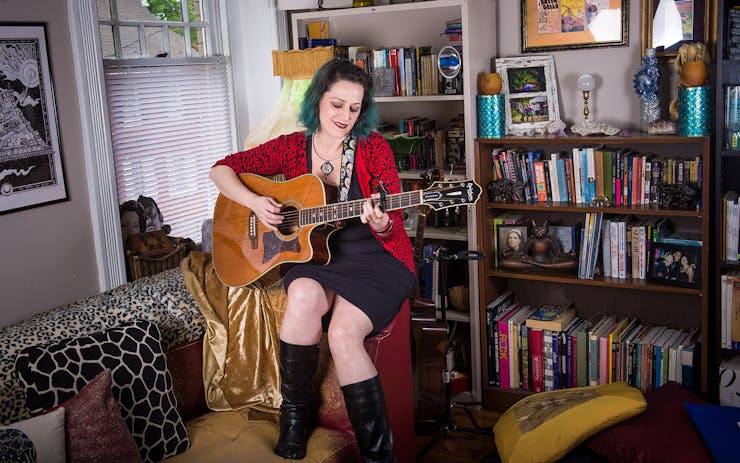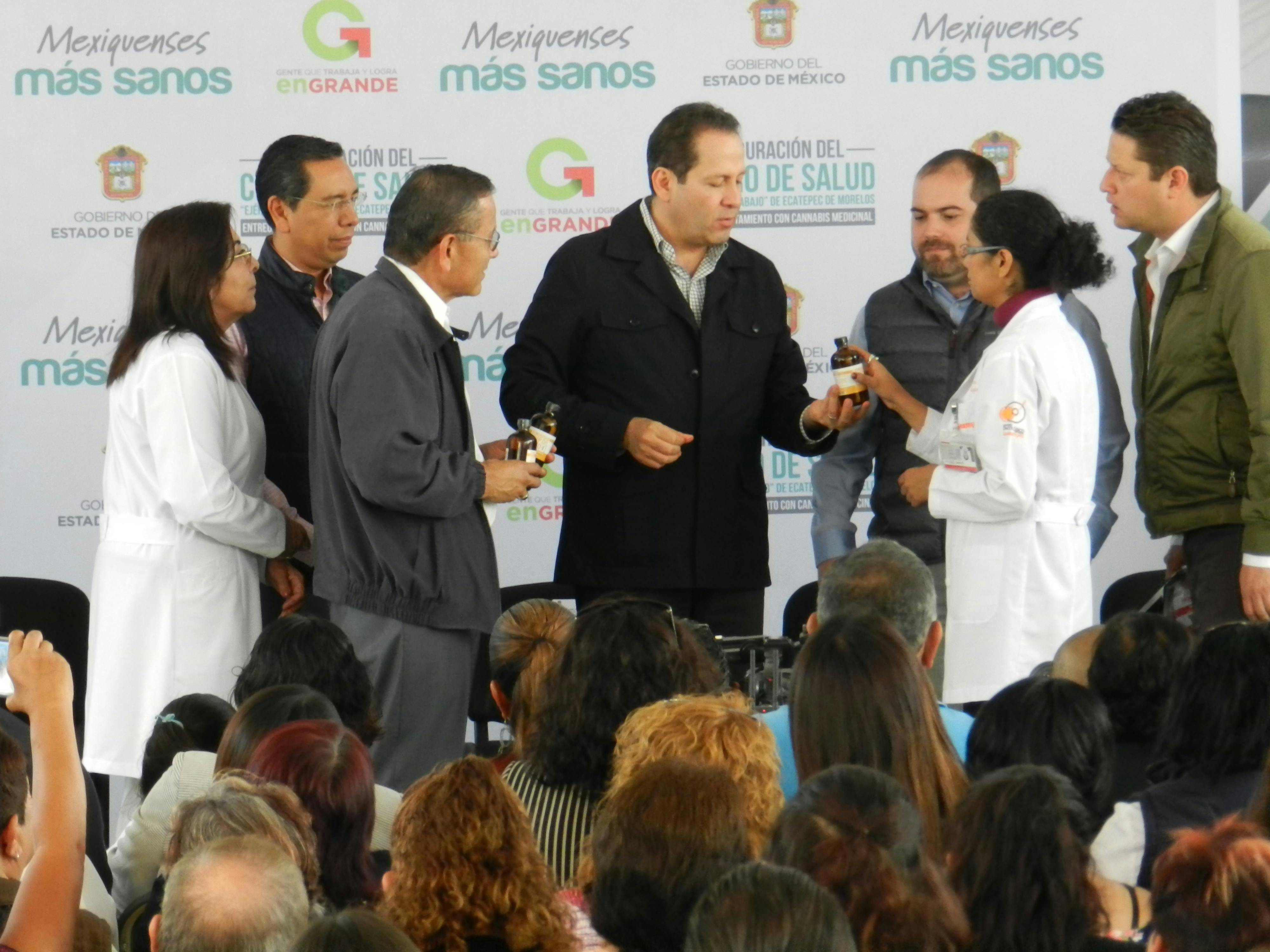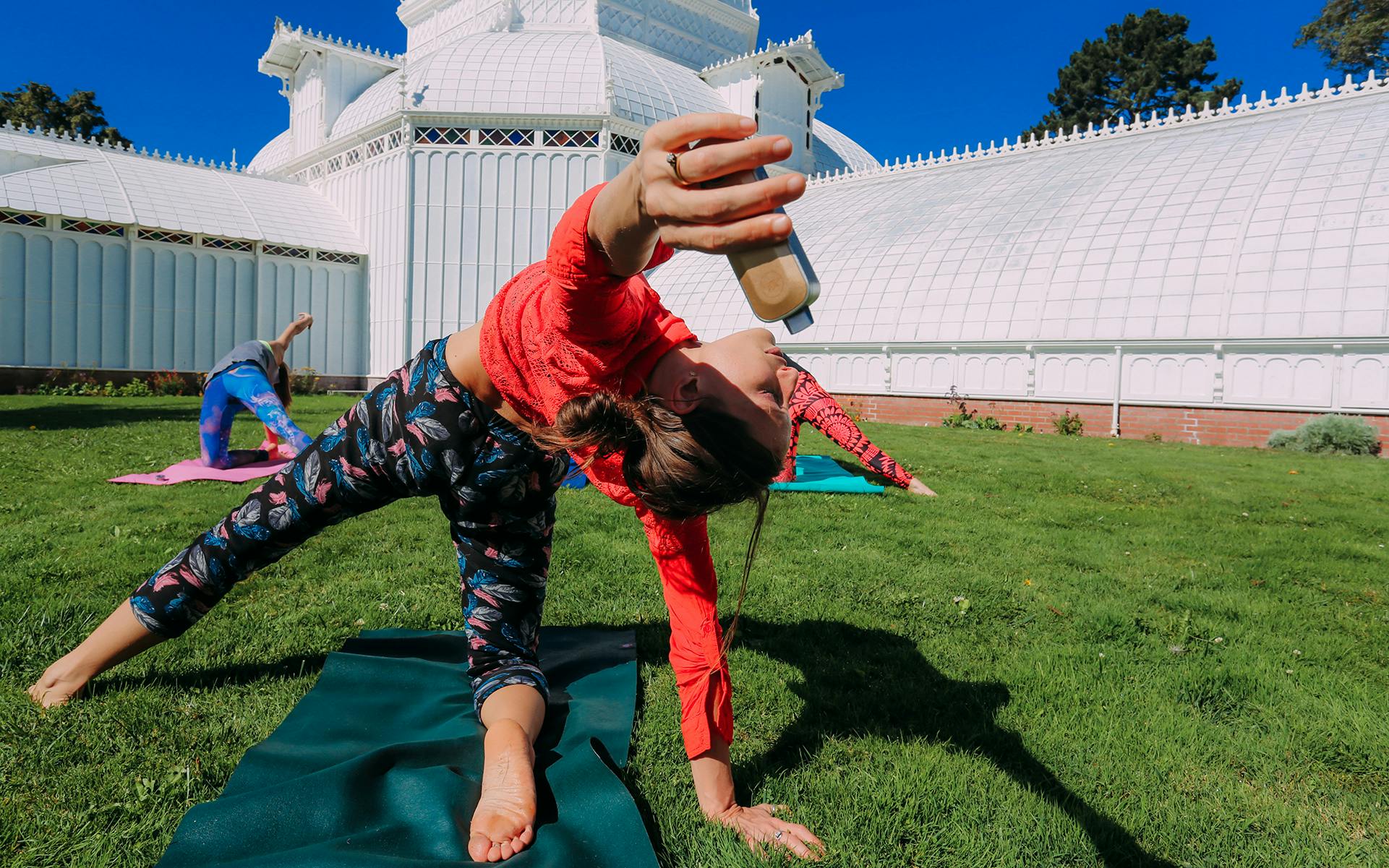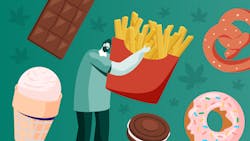Editor’s Note: A few years ago the notion that cannabis could be an exit drug—a tool to help people overcome opioid addiction—was considered fairly radical. Now it’s becoming more widely accepted, thanks to more research and the stories of experience shared by those doing the daily work of recovery. Photojournalist Charles Mostoller set out to document the stories of those who are using cannabis to leave opioids and point their lives in a positive direction. Their experiences are recounted below.
Britt Carpenter, 49
Philadelphia, PA. Runs a dog-care company. After going cold turkey, he started an Instagram community page called Philly Unknown. Carpenter does outreach with homeless people and heroin addicts.

Britt Carpenter, 49, Philadelphia, PA. (Charles Mostoller for Leafly)
I was in a car accident about 15 years ago. I broke my shoulder in five places, and I ended up not getting surgery but a lot of therapy. I was in a lot of pain, and a friend’s girlfriend, who had an ACL surgery, gave me this bag of pills. It was like a PEZ dispenser threw up in a bag. With that and whatever I could get my hands on from a doctor, it became like a smorgasbord.
Eventually I got away from them. But then about four years ago, I met the wrong person, who introduced me to heroin. I started using heavily. It was almost four years of using daily.
It was four years of hell. Four years of some of the most dark times that I’ve ever experienced. Lying to everybody. Losing friends. Losing jobs. Friends telling my parents about me.
I’m harvesting all the negative I had for years, and I’m putting it towards a positive.
The last OD I had, where they brought me back with Narcan, the cop looked at me and said, “You’re lucky we aren’t busy tonight or you wouldn’t be here.” And I thought, Wow, you need to change, to do something. The next day I stopped using. But I didn’t put myself into detox or rehab. I threw myself into photography. I always loved photography. I had done work with the homeless and always worked for the underdog, so I told myself if I go 30 days straight for the first time in four years, that I would start a community page on Instagram and pay it forward to the community. And after 30 days I did start it. And you know, I just hit 19 months clean off heroin, alcohol, everything except for pot.
I went cold turkey just using cannabis at the time. It helped with the shakes and with the paranoia. It helped with the sweats, helped my appetite. I gained like 40 pounds.
The funny thing is that I don’t even want to smoke pot, but it helps me. I don’t sleep a lot at night. I wake up, I’ll close my eyes, and I see things I don’t want to see. I think about the things that I’ve done, and it gets to me, it affects me. So I just use marijuana medicinally to stay on an even keel and to function and have no social anxiety. To be able to get out there and do the things I want to do.
So I started the Instagram page and it’s going strong, and I’ve developed a nonprofit out of it. The community has rallied to it, and we have over 7,000 organic followers. We do outreach in Kensington, and already I’ve saved three people with Nalaxone. We have people doing trainings next week. So I’m sort of harvesting all the negative I had for years, and I’m putting it towards a positive. Paying it forward. —BRITT CARPENTER
Laura Sharer, 35
Wilmington, DE. Mother of two, medical marijuana patient suffering from gastroparesis and fibromyalgia. After giving up opioids, she became an activist and co-founded the Delaware Cannabis Advocacy Network.

Laura Sharer, 35, Wilmington, DE. (Charles Mostoller for Leafly)
I am a patient suffering from gastroparesis, fibromyalgia, and post-traumatic stress disorder. Previously I was on pharmaceuticals, some of them for decades, for lingering stomach issues. Some for only a few years—Dilaudid (hydromorphone), Tramadol, Percocet (oxycodone)—in addition to dozens of antiemetics (anti-nausea), migraine medicine, seizure medicine. It was completely “failure to thrive.” I was basically wasting away with malnutrition, not able to keep solid food down, constant nausea and vomiting. As a last ditch effort, I got turned on to the idea that Delaware has this medical cannabis program, so I tried to get my cannabis card and see if I could get clean and pure access to cannabis, and if that would be different for me. Previously I was a recreational smoker, but I never thought of it as medicine until I had exposure through the program.
Shop highly rated dispensaries near you
Showing you dispensaries nearIn February 2016 my card was approved. At that point, I weighed 96 pounds. I was only able to tolerate liquids.
What I was waking up with was an appetite, not a migraine.
Things got better. The doctor saw that it was an improvement and decided to start trying to wean me off of some of the medications. The Percocet went first, and then I tried to stop the Dilaudid, and that’s when I realized that I was clinically addicted. Luckily, at that point I had my cannabis card and jumped head over heels, full-throttle, into every kind of consumption method I could think of. Topicals on my skin to alleviate the pain, right where it hurt, were very effective for me. Then tinctures or edibles at bedtime to get me through the night sweats and night tremors.
Instead of medicating myself to sleep with Valium, I was medicating myself to sleep with cannabis. And what I was waking up with was an appetite, not a migraine.
Withdrawal is withdrawal. I don’t care what you have to get through it, it’s horrible, just horrible. The night sweats and body pain and twitching. So I’m grateful that I found this option. Now we’re 18 months into cannabis. It took me six months to wean off the 10 daily medications I was taking, and so about a year now completely free—550 days today free of opiates, which is really, really cool. —LAURA SHARER
Bernadette Scarduzio, 38
Drexel Hill, PA. After giving up pain medicines and discovering cannabis, she started physical therapy and is now sponsored by an indoor therapy pool company.

Bernadette Scarduzio, 38, Drexel Hill, PA. (Charles Mostoller for Leafly)
I have Charcot–Marie–Tooth disorder, which is a rare neurological nerve and muscle deterioration disorder that affects the peripheral neuropathy—which controls your hands and your feet, so how do you move your body? There’s all different types of CMT. I have CMT type one, which is the most common. It’s hereditary and my father had it.
I never saw pot as medicine. I was always told that pot is bad, it’s illegal.
Unfortunately I had it the worst of anybody in my family. I went into the chair about nine years ago, just three months after my father had passed. I had stopped doing things because everything was so hard. I wouldn’t go out to the bar with my friends, anywhere shopping, it was just too much for me. It was too painful.
I’ve had 28 operations. My first surgery was when I was 13 years old. The doctors would usually prescribe Percocet. But then as an adult, I realized I could go to any doctor I want. I didn’t have to take the medicines and didn’t have to follow all this stuff I was brainwashed to think. In my early 20‘s, between the anxiety and the pain I just didn’t feel right. And I remember my friend one day was like, “Bern, you should try marijuana.” I’d tried it, of course, but just a few times in high school and it was very rare. But she was like, seriously, there’s all different types, just smoke some with me. So I said all right. And instantly, it was like I was different. I felt better, I didn’t feel sick. And I actually felt hungry, which, usually after taking medicine I couldn’t eat.
I never saw pot as medicine. I was always told that pot is bad, it’s illegal. It was not allowed in my house; my dad would’ve killed me. It was looked at as an illegal drug that’s bad for you. But as an adult, I learned my dad was wrong. He was actually supportive of it once I told him how it helped me.
I started to learn about it and that you don’t just have to smoke it and that you can eat it, and I was like, wow, it helps me sleep, it helps me eat, it helps me be more creative. It helps me be more like me. —BERNADETTE SCARDUZIO
Michael Whiter, 41
Philadelphia, PA. Former Marine, diagnosed with PTSD after leaving the military. After discovering cannabis and giving up pain meds, he became a local cannabis activist and budding photojournalist.

Michael Whiter, 41, Philadelphia, PA. (Charles Mostoller for Leafly)
After 11 years in the Marines, I started having some emotional problems. I was depressed, I was having anxiety, I was skipping work, which in the Marines you just can’t do. So I went to see a psychiatrist, and the second that happened, it was like I wasn’t a Marine anymore. I was ostracized from my unit, put on a bunch of pills—while I was still in the Marine Corps. Shortly after that, I was put out on medical board. I got out, went to the VA [Veterans Affairs], and they just started piling me up with medications. For pain they had me on methadone, but I didn’t like it so they put me on extended-release morphine. They would send this stuff to my house. I could have just taken a whole bottle of morphine and ended it all, but, you know… Anyway, they had me on all that crap, and then they had me on Klonopin on top of that.
I was watching the National Geographic channel one day and I saw a show about cannabis and veterans, and I decided I was going to stop using all these medicines and start using cannabis and see what happens. And here I am.
It wasn’t easy. I stayed very high the first two or three weeks. I had to keep taking one of my antidepressants in smaller doses because I was having withdrawal symptoms from it. It was worse than the opiates. But I stayed pretty sick. I locked myself in my house until I got over it.
Now I leave the house. I have friends that I care about, that care about me.
While cannabis does help you relieve some pain, it also helps you feel, emotionally, again. When you’re on those painkillers you don’t feel anything. It gets rid of the pain, but you are also drooling on yourself. And you’re pretty apathetic about everything that’s going on around you.
Cannabis is not going to dull the pain as much as the opiates are, but it’s also not going to dull your mind. If you get off that stuff you’re going to get sick as hell, but weed will help you through the sickness and it also helps with the pain, with your mood. It will help with everything that’s going on. Because pain comes with depression and anxiety. If you’re in pain long enough, it messes with your mind. And cannabis helps with that.
When I was on all those pills, I just sat in a chair and I drooled on myself. The shades would be drawn all the time. I never went outside, I had my groceries delivered to me.
Now I leave the house. I have friends that I care about, that care about me. I’ve got a pretty decent life that I live now, and I’m happy. I care about what kind of life I want to live, and I think I’m doing a pretty good job of living it now.
I’ll never say that cannabis cured me of anything. Because I did the work to help myself. But cannabis really helped me engage with therapy. It helped with self-reflection, to get to know myself better. Cannabis gives me perspective on things. When I was using opiates and the other medications, the only perspective I had was what I was seeing on TV. It’s a totally different medicine. Cannabis helps people, and the other stuff is killing them. —MICHAEL WHITER
Deb Guy, 41
Lancaster, PA. Founded Lancaster chapter of NORML. After giving up pain meds and discovering cannabis, she took up singing and playing guitar.

Deb Guy, 41, Lancaster, PA. (Charles Mostoller for Leafly)
I’ve used cannabis off and on since I was a teenager, as kids do, but when I was 28 I was diagnosed with fibromyalgia and degenerative joint disorder.
I have early onset osteoarthritis. My grandparents on both sides and my mother all had rheumatoid arthritis, and my doctors are trying to prevent me from getting that. But in the meantime, they started prescribing opiates on top of all the other medications I was on. It started with Vicodin, but soon I realized you have to increase the dose because you get used to it, so I started to take anywhere from three to six pills a day. And that use kind of grew until the Vicodin wasn’t helping anymore. I knew that my grandmother and my mother all had oxycodone or morphine, and I started to palm them.
So I would get up in the morning and I would take two or three Vicodin, and then later in the afternoon I might take two or three more, or I would take an Oxy, or I’d take two Oxy. And then a few hours later, if that wasn’t doing anything, I’d pop one of the small milligrams of morphine and it was just a constant cycle. I was not healthy at all. I couldn’t get out of the bed in the morning without massive muscle cramping and spasms.
I got married and immediately got pregnant. My doctors were like, “You’re fine on the medications you’re on, just reduce what you are taking, but you can still take the Vicodin [and] the ADHD medicine.” And I thought, OK, I’m going to listen to my doctors. And then four months later, I had a miscarriage.
When I was on the opiates, I didn’t want to sit up, I didn’t want to stand up. With cannabis, I love to just toke and run.
It was kind of a blessing in disguise. It made me realize that I didn’t want to have children and that I was OK with it. It also helped me realize that I wanted to get healthy. I threw the pills away and went cold turkey. And it was the worst three weeks of my life.
I went through terrible withdrawal, but I smoked cannabis as often as I could, almost immediately. And it helped tremendously. I got through that first three weeks of sickness and massive withdrawal. I started to smoke cannabis in the morning like it was my coffee cup and then take a walk. I started to do that, and every day I would walk a little further, and within a year I had dropped 60 pounds. My body didn’t hurt nearly as bad. The degeneration had slowed down a little.
My doctor was kind of shocked and asked me what I had changed. At the time I didn’t tell him. I just said I was being holistic and healthful and eating correctly and exercising and it seems to be reducing. When I went back six months later I finally decided to tell him, because at that point I had decided to become and activist and start a chapter of NORML here in Lancaster.
This idea that cannabis makes you stupid or slow or lazy is just ridiculous. because when I was on the opiates I didn’t want to sit up, I didn’t want to stand up, I didn’t want to get out of bed in the morning. With cannabis, I love to just toke and run. I love to get outside, it got me out of the house. It got me standing up. —DEB GUY







